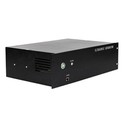Hey there! As a supplier of ultrasonic filtration systems, I often get asked this question: "Is an ultrasonic filtration system expensive?" Well, let's dive right in and break it down together.
First off, what the heck is an ultrasonic filtration system? It's a pretty nifty piece of tech that uses ultrasonic waves to enhance the filtration process. You see, in regular filtration, particles can clog up the filter medium over time, reducing its efficiency. But with an ultrasonic filtration system, those ultrasonic waves create tiny bubbles through a process called cavitation. These bubbles then implode, creating shockwaves that dislodge the particles stuck in the filter, keeping it clean and working at its best.


Now, let's talk about the cost. When you're looking at buying an ultrasonic filtration system, you're not just paying for the physical equipment. There are a bunch of factors that go into the price.
One of the main things is the size and capacity of the system. If you've got a small operation, say a jewelry cleaning shop, you might only need a relatively small Ultrasonic Tank Filter. These are great for filtering the cleaning solution in a small tank. They're usually more affordable because they don't need as much power or as large a filtration capacity. On the other hand, if you're running a big industrial plant that needs to filter large volumes of liquid continuously, you're going to need a much larger and more powerful system, like an Ultrasonic Pipe Filter. These are designed to be installed directly into pipes and can handle high - flow rates. But of course, with that increased capacity comes a higher price tag.
Another factor that affects the cost is the level of automation. Some ultrasonic filtration systems are fully automated. They can adjust the ultrasonic frequency, power, and filtration rate based on the quality of the liquid being filtered. These systems are super convenient because they require less manual intervention, but they're also more expensive. You've got all that fancy technology built in to make them work so smoothly. Then there are the semi - automated or manual systems. These are a bit more hands - on. You might have to adjust the settings yourself or monitor the filtration process more closely. They're generally cheaper, but they do require more of your time and attention.
The quality of the components also plays a big role. High - quality ultrasonic transducers, which are the parts that generate the ultrasonic waves, are more expensive. But they also last longer and are more efficient. Cheaper transducers might save you some money upfront, but they could break down more easily and need to be replaced more often. The same goes for the filter media. A high - grade filter media will do a better job of filtering out particles and will last longer, but it'll cost more.
So, is it expensive? Well, compared to a basic, non - ultrasonic filtration system, an ultrasonic one is usually going to cost more. But here's the thing: it's an investment. Let's look at the long - term benefits.
One of the biggest advantages is the reduced maintenance cost. Because the ultrasonic waves keep the filter clean, you don't have to replace the filter media as often. In a regular filtration system, you might have to change the filter every few weeks or months, depending on how dirty the liquid is. With an ultrasonic filtration system, you can stretch that out to months or even years. That means you're saving money on replacement filters and on the labor to change them.
There's also the improved efficiency. An ultrasonic filtration system can filter the liquid more quickly and effectively. That means you can process more liquid in less time, which can lead to increased productivity. In a manufacturing plant, for example, that could translate into more products being made and more money being earned.
It can also improve the quality of the filtered liquid. Since it can remove smaller particles and keep the filter clean, the liquid that comes out of the filtration system is cleaner. This can be crucial in industries like food and beverage, pharmaceuticals, and electronics, where even a tiny particle can cause problems.
Let me give you an example. Say you're running a car parts manufacturing plant. You use a cleaning solution to clean the parts before they're assembled. With a regular filtration system, the cleaning solution can get dirty quickly, and you might end up with parts that aren't as clean as they should be. This could lead to quality issues and even product recalls. But if you use an ultrasonic filtration system, the cleaning solution stays cleaner for longer. The parts are cleaner, which means fewer quality issues and more satisfied customers.
Now, I know that the upfront cost might still seem a bit daunting. But here's a tip: you can look into financing options. Many suppliers offer financing plans that allow you to spread out the cost over time. That way, you can get the benefits of an ultrasonic filtration system right away without having to pay a huge lump sum all at once.
If you're still on the fence about whether an ultrasonic filtration system is right for you, I'd be more than happy to have a chat. I can help you figure out what size and type of system would work best for your needs and give you a more accurate quote. Whether you're a small business owner or a big industrial player, there's an ultrasonic filtration system out there for you.
So, if you're interested in learning more about our ultrasonic filtration systems, or if you want to discuss your specific requirements, don't hesitate to reach out. We're here to help you make the best decision for your business.
References
- General knowledge of ultrasonic filtration technology from industry experience.
- Case studies and research on the benefits of ultrasonic filtration systems in various industries.





